Key takeaways:
- Anti-war activism emphasizes the need for peace over militarism and highlights the power of personal narratives to inspire change.
- Lobbying Congress is essential for influencing policy, as it humanizes statistics through shared stories and fosters accountability among elected officials.
- Successful lobbying involves forming alliances, persistent communication, and clear messaging to effectively advocate for peace.
- Building genuine relationships with representatives and leveraging storytelling can significantly enhance activism efforts and mobilize grassroots initiatives.
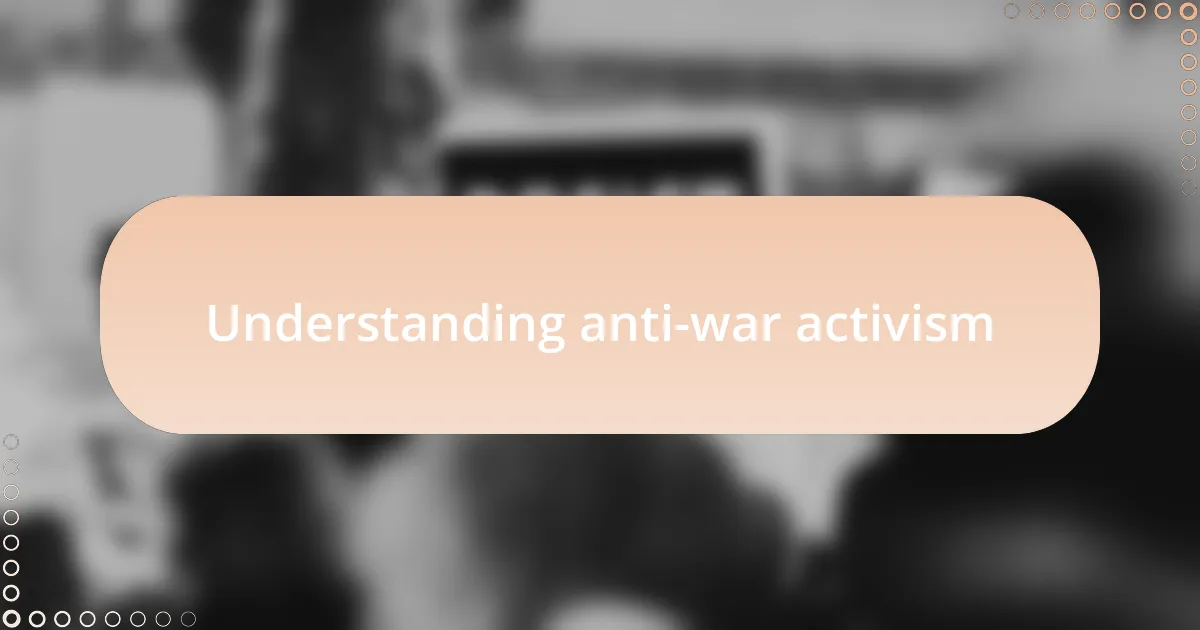
Understanding anti-war activism
Anti-war activism challenges the very foundations of militarism and calls for a reevaluation of how societies prioritize violence over peace. I remember standing in a crowded park years ago, listening to a veteran recount the harrowing experiences of war. It struck me then—why do we glorify these stories at the expense of the countless lives lost?
At its core, anti-war activism is about more than just opposing warfare; it’s about envisioning a world where diplomacy and dialogue take precedence. I often find myself pondering the impact of grassroots movements. How many lives could we change if we united our voices in demand for peace? The emotional weight of knowing that my voice contributes to a larger chorus for change fuels my resolve.
Moreover, anti-war activism has always drawn on the pain of personal and collective experiences. I recall a protest where mothers holding photographs of their children lost in conflict stood side by side with young activists. Seeing that blend of anguish and hope reminded me of the urgent need for compassion in our pursuits. It raises the question of how we can harness such powerful emotions to inspire action and transform our communities.
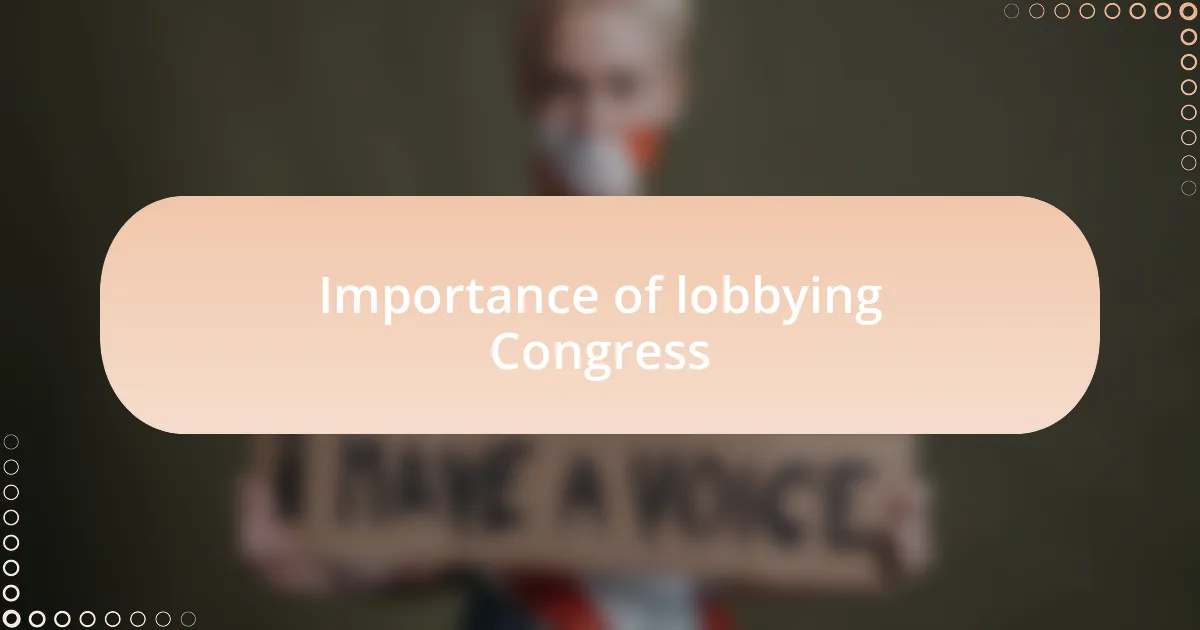
Importance of lobbying Congress
Lobbying Congress holds significant importance in the realm of anti-war activism, as it provides a direct avenue for citizens to influence policy. I vividly recall a time when I stood outside a congressional office building, rallying with fellow activists, holding signs that demanded peace. That moment made me realize how our collective voices could resonate in the halls of power, pushing representatives to reconsider their stances on military intervention.
Getting involved in lobbying isn’t just about making demands; it’s about sharing real stories that humanize the statistics often thrown around during debates. When I presented my testimony about a friend’s experience returning from deployment, I saw lawmakers shift in their seats and begin to listen. It left me wondering—how many more personal stories could change the course of legislation if we all shared our truths?
Furthermore, effective lobbying creates a sense of accountability among elected officials. I remember meeting with a congressional aide who seemed genuinely moved by our discussions on war’s impact on families. This experience reaffirmed my belief that when constituents hold their leaders responsible, it fosters a deeper connection that can inspire significant change. How often do we think about the power we hold as citizens to shape our government’s actions? It is more potent than we might assume.
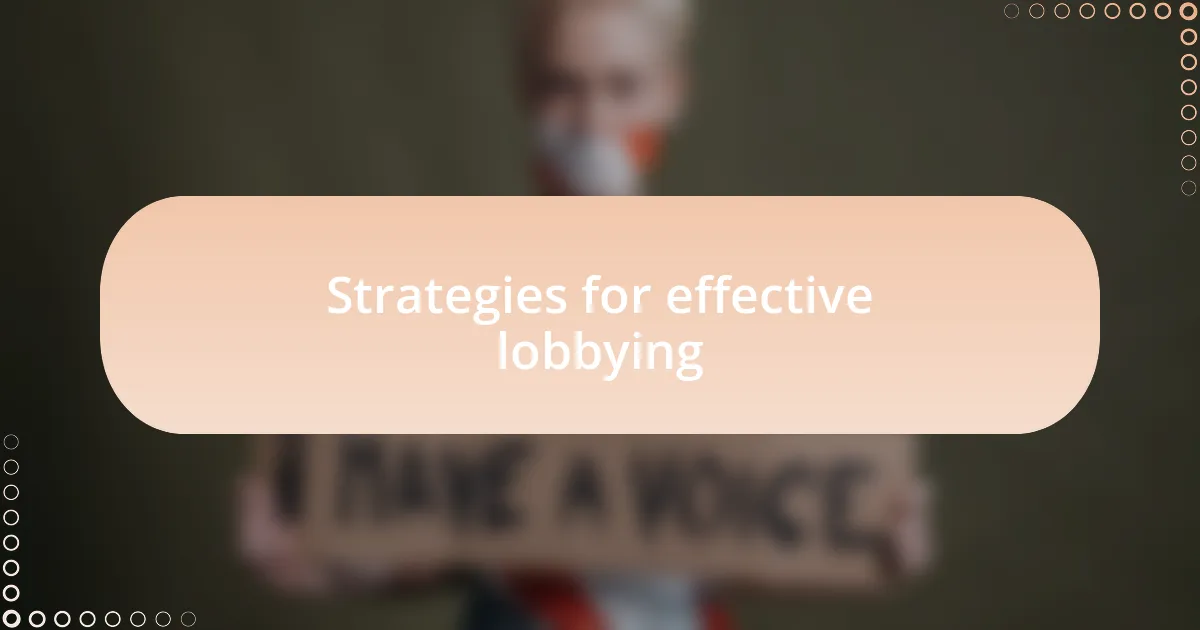
Strategies for effective lobbying
One of the most effective strategies I’ve found in lobbying is forming alliances with like-minded organizations. I vividly recall teaming up with a local veterans group that shared our anti-war message. When we combined our voices, we not only amplified our presence but also showcased a united front that policymakers couldn’t easily ignore. Have you ever considered how much more impactful a coalition can be compared to individual efforts?
Another strategy involves being persistent yet respectful. I remember a time when I followed up on a meeting with a Congress member’s office multiple times. Each interaction built rapport and respect, turning what began as a simple conversation into an ongoing dialogue. How often do we underestimate the power of consistent communication in advocacy?
Lastly, crafting clear and concise messages can significantly enhance the effectiveness of your lobbying efforts. I learned this firsthand when I prepared a one-page brief summarizing the key impacts of military engagement on our community. It struck me how a well-organized document could make a complex issue accessible to busy legislators. Have you ever tried condensing your thoughts into straightforward points? The clarity can sometimes pave the way for meaningful change.
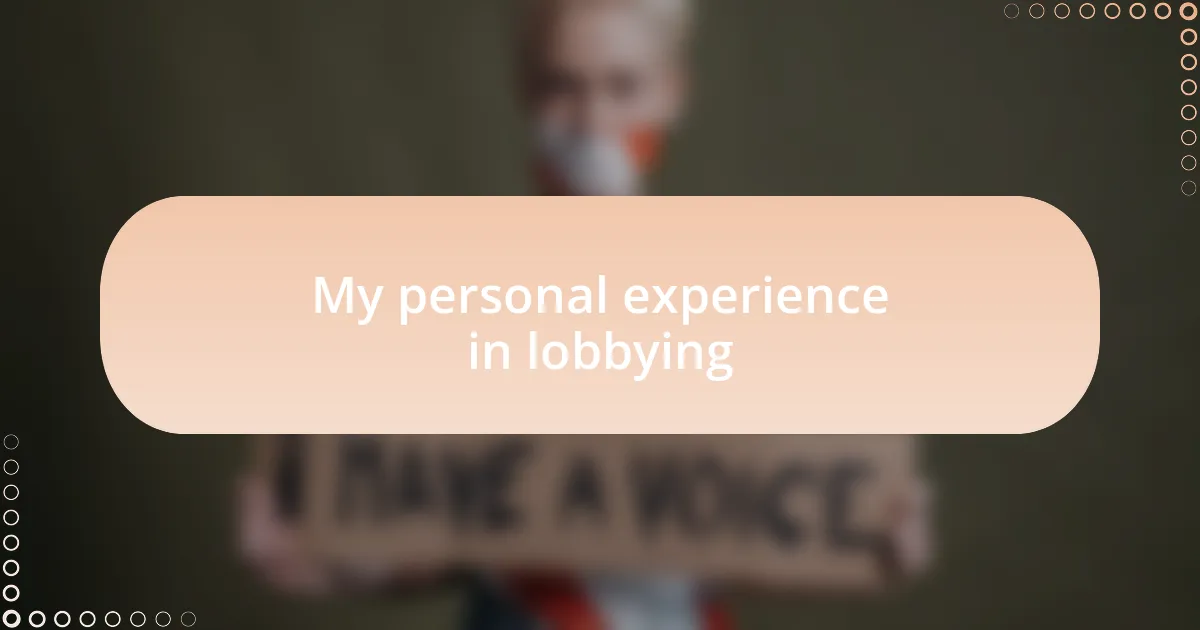
My personal experience in lobbying
I recall my first experience lobbying on the Hill, feeling a mix of nervousness and excitement. Walking into that grand building, I realized that my voice mattered. It was during a meeting with a congressional aide that I shared a story about a friend who had returned from deployment traumatized. When you can connect emotionally, it brings humanity to the statistics. Have you ever wondered how personal narratives can shift perspectives?
Another memory that stands out is the day we organized a sit-in outside a senator’s office. The energy was electric, filled with passionate activists holding signs and chanting for peace. I remember feeling a sense of solidarity; we weren’t just individuals but a powerful collective. How often do we underestimate the strength of our community in catalyzing change?
Once, a congressional staff member told me that our persistent presence made a difference. I had been attending town halls and forums regularly, and the familiarity built a connection. That experience solidified my belief that grassroots initiatives create a ripple effect. Doesn’t it resonate when we realize that our consistent efforts, no matter how small, can lead to significant shifts in policy?
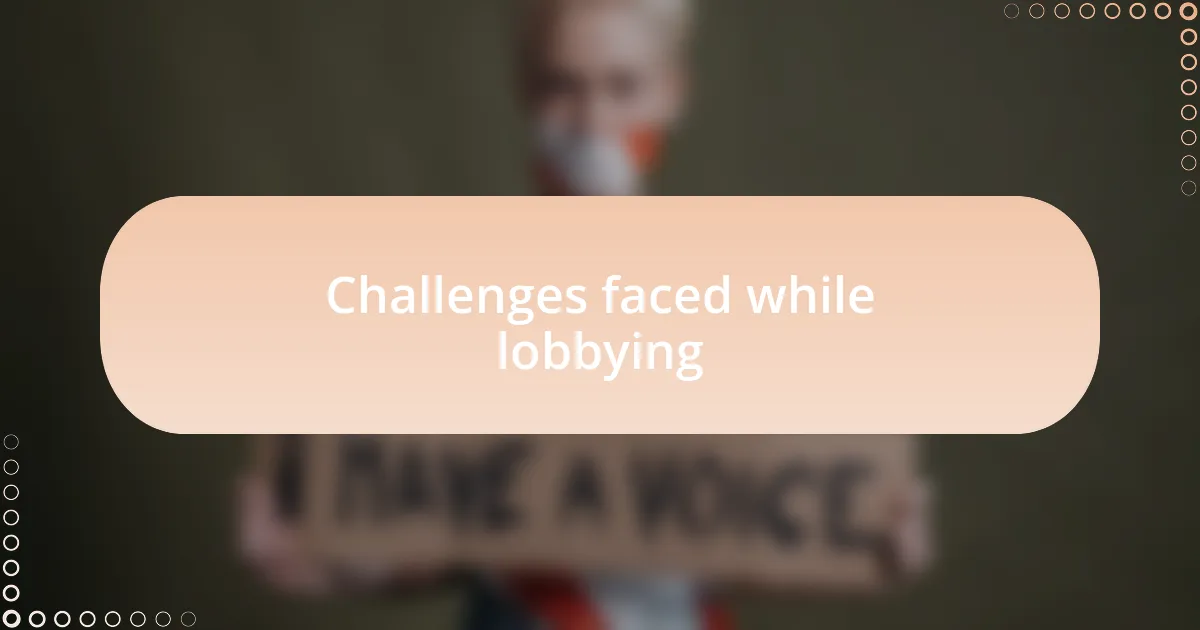
Challenges faced while lobbying
One of the toughest hurdles I faced while lobbying was navigating the complex nature of Congressional schedules. I vividly remember waiting hours for a brief meeting with a representative, only to be informed that they were delayed yet again. How many times have you invested your energy into a meeting that felt frustratingly out of reach? It enforced the reality that patience is crucial, even when there seems to be a constant battle against time.
Another challenge was articulating my message succinctly in a world filled with competing interests. I once practiced my pitch several times, only to realize I was bombarded with questions about budget implications and other technicalities. It made me think: how often do we forget that clarity is key? I learned that ensuring my message was not only passionate but also grounded in facts was essential to being heard.
Perhaps one of the most emotionally taxing challenges was witnessing the indifference from some officials. After sharing compelling stories highlighting the human cost of war, there were still moments when I felt like I was speaking into a void. This raises a difficult question—what do we do when empathy seems absent in decision-making processes? I found solace in the idea that every effort counts, no matter how small, in changing hearts and minds over time.
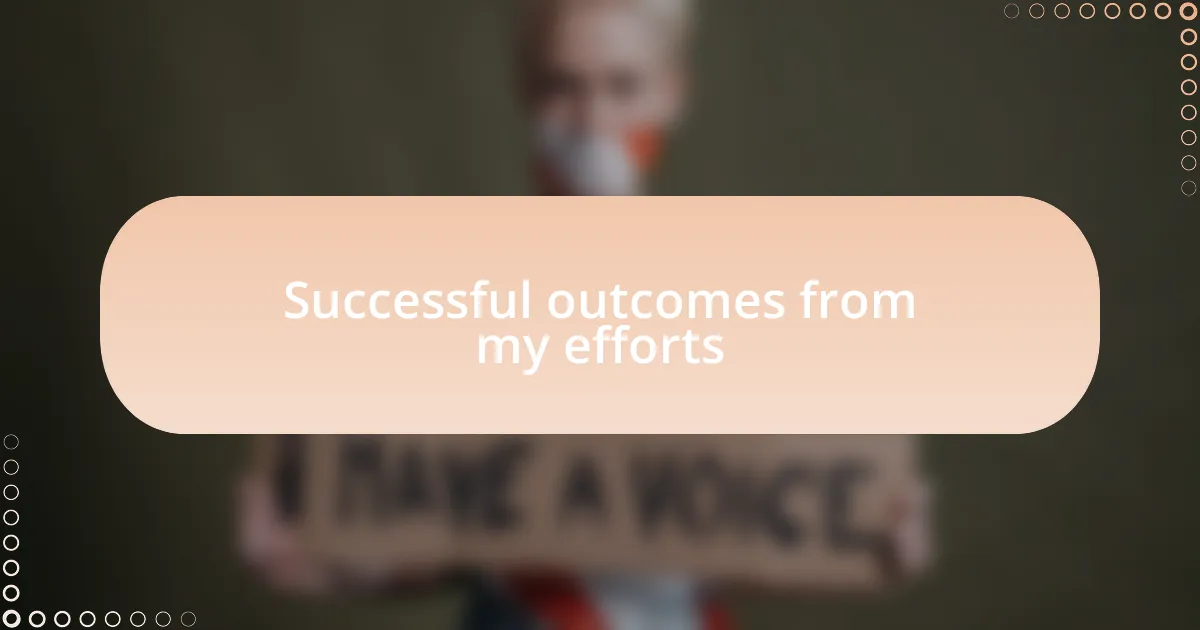
Successful outcomes from my efforts
One of my most rewarding moments came when a key senator agreed to sponsor legislation aimed at reducing military spending. I still remember the meeting where I laid out the potential benefits of reallocating those funds towards education and healthcare. Seeing that spark of interest in their eyes affirmed my belief that effective lobbying can indeed foster significant change. Isn’t it incredible how one conversation can reshape priorities?
Another breakthrough occurred during a town hall event where constituents began to share their own stories about the impact of war on their communities. Hearing their voices amplified my message, and I realized that when people come together, they can create a force that even Congress must acknowledge. Can you imagine the power of unified voices? It was a poignant reminder that our individual experiences can drive collective action.
Finally, witnessing the passage of a resolution supporting diplomatic solutions over military action felt like a victory that transcended my personal efforts. I initially struggled with doubt, thinking my contributions were just a drop in the ocean. But standing in the audience that day, surrounded by fellow activists, I was overcome with pride. It was a clear indication that persistence, combined with solidarity, truly leads to fruitful outcomes.
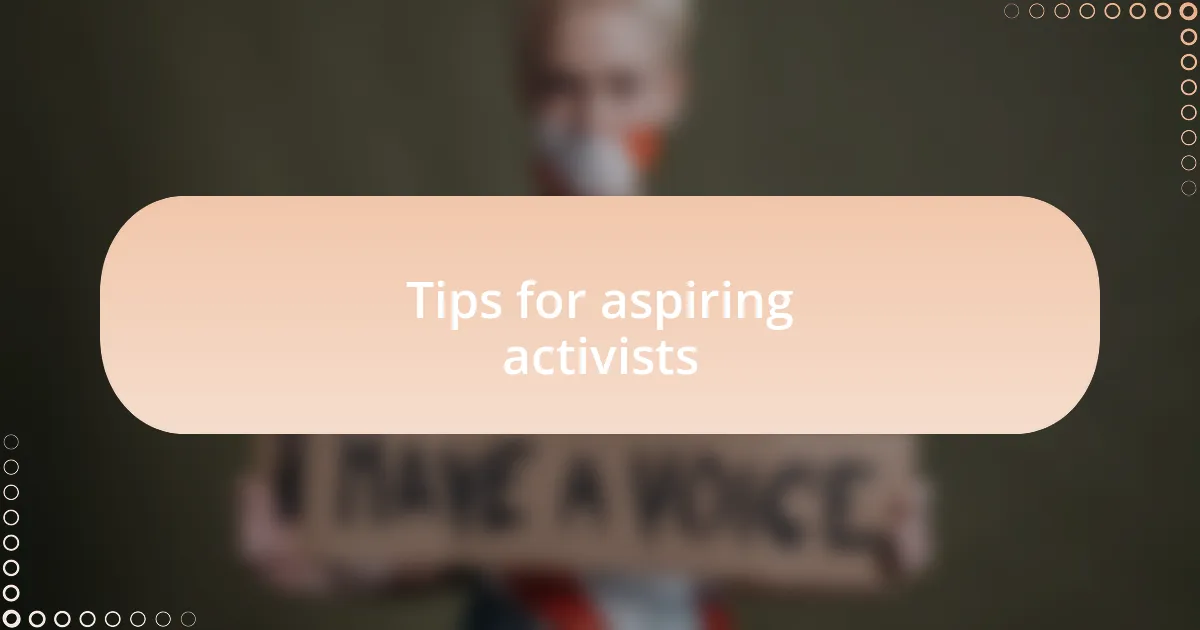
Tips for aspiring activists
When stepping into activism, I’ve learned the importance of building genuine relationships with your representatives. During my early days, I focused too much on what I wanted to say instead of engaging them in a conversation. It was eye-opening when I started asking about their priorities and finding common ground—suddenly, I wasn’t just a voice but a partner in discussion. Have you ever considered how powerful it is to align your goals with theirs?
I’ve also found that storytelling is one of the most impactful tools in advocacy. One time, I shared my own family’s experiences with the consequences of military actions during a community meeting. The room grew silent, and I could feel empathy ripple through the audience. It reminded me of the magic that happens when people see the human side of issues. What story can you share that might resonate with others?
Don’t underestimate the power of grassroots organizing. I remember organizing a small rally in my neighborhood. Initially, it seemed daunting, but as we planned together, our enthusiasm grew. The turnout was modest, but the energy was infectious, and we sparked conversations that radiated beyond that day. Have you considered how starting small can ignite bigger movements?